Three very different towns in Northern India
Leaving the concrete jungle of Chandigarh, I headed for the old British hill station of Shimla aboard the narrow-gauge railway—affectionately called the to the Shimla Toy Train—which winds its way over the course of eight hours through more than a hundred tunnels and even more switchbacks.
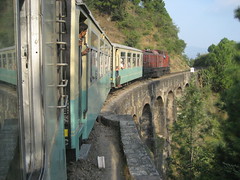
The town was once a summer home to the Britsh Raj, who came to get out of the overwhelming heat of Delhi. Shimla is a hugely popular vacation and honeymoon center for affluent Indians, and as a result the town has a really relaxed atmosphere and I enjoyed spending a few days people-watching, strolling along the British-colonial architecture, browsing the busy market street, and enjoying the delicious north Indian cuisine. Here's a video of Shimla's market street, followed by a few scenes from the city:
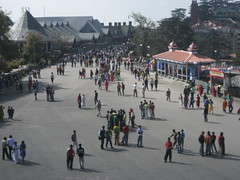
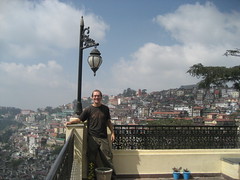
The only thing that prevents Shimla from being truly relaxing is that the town is chock-full of monkeys. Walking down the street, you’ll hear a bit of rumbling from a rooftop, and then — BAM! — a monkey falls from the sky and hits the ground in front of you. It gets a little bit freaky sometimes. The locals must think so too: they’ve shipped a bunch of the crazy monkeys to a park in Tajikistan. Here’s a shot of a sleepy monkey, followed by a video of a few monkey-acrobats:
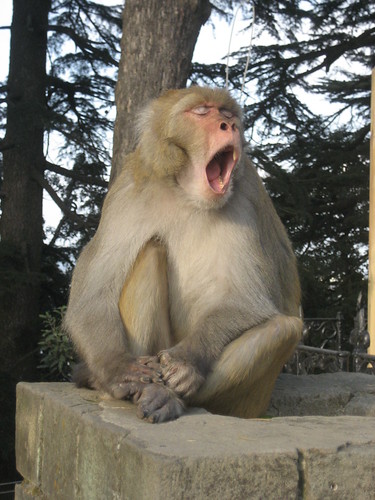
Sightseeing options in Shimla are a bit limited, but I did check out lemon-yellow Christ Church which is only the second Christian church to be built in India. I also made the trip to the Himachal Pradesh State Museum, which was surprisingly great. Highlights from the small museum included intricate Indian miniature paintings, an excellent collection of old coins, a display of traditional clothing from different periods of time within the state, and an interesting collection of local contemporary paintings. There was also a small section about Gandhi, which included a fascinating letter he sent to Adolph Hitler in 1939, which begins, “Friends have been urging me to write to you for the sake of humanity.”
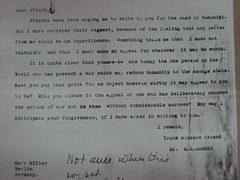
I left Shimla on a night bus bound for the little mountain town of Manali, a popular travelers hangout and a base for doing a number of outdoor activities in the area. One of my big reasons for doing this quick tour of Northern India was to try to get out of Delhi’s 90 degree heat for a little while. As I arrived in Manali just before dawn, it was clear I was going to get way more cold than I wanted: the town was freezing and teetering on the edge of winter. A lot like a Colorado ski town, I arrived at exactly the wrong time: it was too cold for summer activities, and the snow hadn’t hit yet to attract the skiers. I enjoyed myself anyway, hanging out in cozy restaurants, reading over tea, exploring the nearby villages, and navigating the crowded streets of the city center. Although I had started getting used to the trash and pollution everywhere, Manali’s otherwise beautiful mountain setting made it all seem so much worse. Trash seemed to cling to every surface, rivers and streams smelled like bathrooms, and the air in the town center was so polluted that I had to hold the arm of my sweater over my mouth in order to breathe. I’m not yet sure what to think of India’s astounding sanitation and pollution problem, but it will certainly be a major hurdle for them as they escalate into the first world over the next thirty years. Here are a few scenes of the mess:
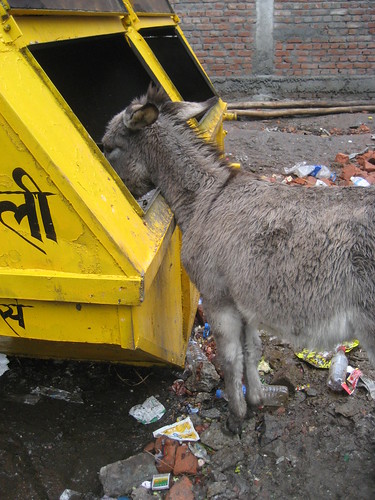
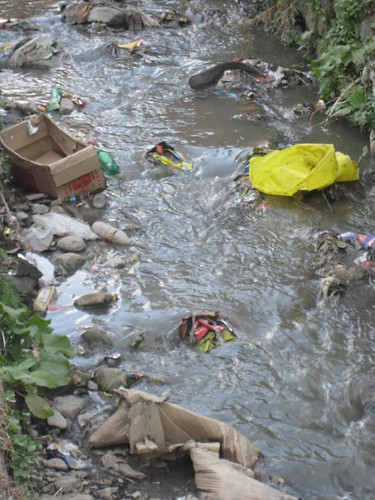
After a few days in Manali, I was very ready to leave so I got on another night bus, this time bound for Dharamsala, which has served as the home of the Tibetan government-in-exile and the Dalai Lama, who came to the town in 1959 after barely escaping Chinese-occupied Tibet. In my first few minutes of walking through the nearby town McLeod Ganj where I’m staying, I experienced culture shock. This time the shock wasn’t a result of the trash, the hassles, or the poverty, but from something else: Americans. Throughout the last three months, I’ve probably come across a total of about 75 Americans. In the course of a single day in Dharamsala, I ran across at least twice that many. Eating lunch, I overheard pieces of a conversation: I can’t believe Steven Soderbergh directed that movie… it just seems so out of character for him, you know? I just sat there with my mouth open in shock. Hearing a mass of Americans talk about regular American stuff with each other was really weird for some reason. I suppose I’ve just gotten so used to not being able to understand what anyone is saying that it has become normal for me. All over town, it was the same story: You should buy that scarf here, honey, it’ll be a lot cheaper than back in Boulder. Boulder? As in… Boulder, Colorado? I don’t know what it is about Dharamsala, but it brings us Americans in droves.
I’ve been here for a couple of days now, and I am absolutely overwhelmed by the staggering amount of stuff there is to do here, mostly revolving around Tibetan culture. McLeod Ganj is the main Tibetan stronghold outside of Tibet, and the relatively small town is mostly Tibetan despite being in India. Movie houses around town screen movies about Tibet along with a handful of Hollywood blockbusters, you can sign up to learn the Tibetan language, get schooled in the basics of Tibetan massage, and more. I’m in the middle of a three-day Tibetan cooking class along with a couple of other foreigners, which has been fantastic. So far, we’ve had a day learning the ins and outs of making different types of momos (steamed dumplings) and a day making variations on bread. Tomorrow we’ll tackle a few different recipes of soup.

Yesterday, I paid a visit to the main Buddhist temple in town, located just a few steps away from the Dalai Lama’s residence, where he lives when he’s not on his regular speaking tours across the world. The temple serves as the main spiritual center for Tibetan refugees, who are forbidden by the Chinese to make the trip into Tibet to the Johkang Temple in Lhasa. The temple complex and foreign tourists alike are overwhelmed by the loud Indian visitors, who unfortunately seem to come to the temple just to get pictures with foreigners and practice their English. Here’s the first of many groups of people that took pictures of me — I know it’s really hard to distinguish me from the group so I’ll give you a hint: I’m the white one in the middle.
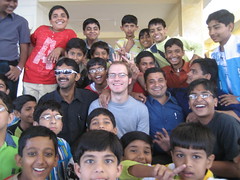
The other night, I went to a coffee shop to listen to a Tibetan refugee talk about the horrific ordeal he has been through in Chinese-occupied Tibet. When he was eighteen, he served as a monk in a monastery which was taken over by the Chinese, who imposed a strong set of rules on the monks so that the monastery would be run in harmony with Chinese politics. At risk to their own lives, he and three of his friends decided to rebel by putting up posters around town denouncing the Chinese occupation. They immediately fled the towns and lived in hiding for almost twenty days before they were captured and imprisoned. After three years and two different prisons where he sat in solitary confinement, he was transferred to a work camp where he was forced to work long hours inside a dangerous mine. After only a few months, he was horribly injured by a piece of machinery inside the mine; both of his legs were broken along with one arm, so he was taken to a Chinese hospital where they quickly declared that his legs must be amputated. Thankfully, he was granted the request to be transferred to a Tibetan hospital where he slowly got better, legs and all, over the course of almost two years. As he recovered, there was pressure from the Chinese for him to go back to the work camp. With the help of an old teacher, his doctor, and his sister, he was somehow able to escape Tibet and flee into India. He made his way to Dharamsala where he has been living for years as a refugee, but is trying hard to get Indian citizenship in hopes that he will be able to return to Tibet to visit his family and friends. Visiting is still a risky proposition, because he stands the chance of being imprisoned again for his old crimes, but he thinks that the Indian government will protect him from the Chinese.
It was a pretty heartbreaking story, and unfortunately, I’m sure ones like it could be told by many other people in town, and in other refugee communities in India, Nepal and other parts of the world. Even more shocking is that these horrific events are still happening. Just yesterday, a group of 42 Tibetans trying to flee into India over a mountain pass were gunned down by the Chinese military, killing a nun and a young girl and injuring many. The only reason word got out that this happened was because some western trekkers happened to be on the same mountain pass and caught the whole thing on video and in pictures. Since China’s government highly censors media and there is no free press, people living in Tibet and the rest of China will likely never hear about it ever happening.
Despite a decent amount of international pressure, Tibet remains under strict Chinese control. Although I’m only recently aware of all of these issues, it seems clear to me that the Tibetans have one big shot at gaining a truly autonomous province: the 2008 Olympics in Beijing. At no other time in the history of China will there be more foreign press in Beijing, and it seems to me that if enough people made enough noise, something substantial could be done about the Tibet situation, among other things. Although my brother would probably have a lot more insight into whether or not pushing China to change is completely idealistic (care to comment Bill?), it seems like if they ever would change it would be based on a huge amount of international pressure and potential national embarrassment. Here are two Tibet-related websites that you could check out if you’re interested in learning more or taking action:
I’m planning to hang out in Dharamsala for a few more days because there’s so much to do, then I’m headed for Armitsar, located a few miles from the India-Pakistan border. Then I’ll make my way down to the desert towns of the Rajasthan state where I’ll spend about a month before flying to Thailand to meet up with my friend Gerni, who I’m quite happy to say will be traveling with me for a few months.
Also, while I was in Manali, I made it to Day 100 of my trip, which means that I still have three-quarters of my trip to go — a simultaneously scary and exciting thought. I was going to write a big Day 100 post with all of my thoughts and feelings so far, but I was far too busy traveling and the moment passed. I’ll just give you a quick and shallow summary of thoughts, realizations, and things I miss:
Well folks, that about wraps it up. Thanks for reading this absurdly long post. More than four pages in Microsoft Word — a new record!
Ryan!
Photos uploaded: I’m totally caught up with my photos, so go check em out! There are new photos from my trek in Nepal, Chitwan National Park, Delhi, Chandigarh, Shimla, Manali and even a few from here in Dharamsala. I’ll try to upload more videos from the last month, but for now I’m just going to focus on keeping everything up to date.
6 Comments:
I don't know you too, too well, but you are missed. I have really enjoyed reading about your trip. I'm still amazed at your bravery - I don't know if I could travel for so long, by myself.
This is an interesting post, in regard to your information surrounding the Chinese government. I wonder if it will ever change, I fear the answer is no. But, there is always hope.
It's a thrill to read and learn about your travels, Ryan. What an amazing experience! I'm excited for you and I love living vicariously through these blogs, it's like I'm right there along-side. You're a very courageous person. Good luck and be safe! - Corwin
As far as changing Tibet through embarrassment of humiliation, it might be somewhat effective, especially from NGO’s and people who are unaffiliated with the government. But, all in all, I doubt that it would have much impact. I don’t think Westerners can have too much influence on events in Tibet.
Why?
Here are a few reasons I can think of:
1) To be fair to China, Tibet was an important place on the chessboard in Russia and Great Britian’s 19th century rivalry known as the “Great Game”. The two empires struggled for territory over the Crimea, Xinjiang, India, Tibet, Korea, and all sorts of other places. From China’s point of view, these two nations seriously eroded its sovereignty in China itself. Allowing a foreign empire to have a colony on your borders is dangerous. Under these circumstances, China would naturally see maintaining Tibet as a vital key to securing “China proper”.
2) As mentioned above, China and Russia have traditionally sought protection of their homelands by pacifying and securing border areas. So, for China, Tibet is a key piece of its geopolitical security. The US has military bases in Korea, Japan, Afghanistan, “Pakistan (where we already have four bases), India, Australia, Singapore, Malaysia, the Philippines, and even, unbelievably, Vietnam” In total, the US has about 130 military bases worldwide. China views themselves as being encircled. A truly “free” Tibet would immediately align itself with the US and other powers to counter China. The Chinese aren’t dumb enough to let that happen.
http://www.commondreams.org/views04/0115-08.htm.
3) China also perpetuates a history of “victomhood” by the Western imperialist powers, which indeed is based on fact. Chinese people massively despise being labeled as “evil” or other such things. Any attempt to embarrass China without Chinese people feeling that your genuinely are rooting for their development is bound to be treated with contempt.
4) Most actions regarding foreign or Tibet complaints about the brutal treatment of Tibetans on the part of the Chinese will never reach a mainstream Chinese audience due to censorship. So, a normal Chinese person would react to a foreigner (no matter how well-intentioned) complaining about human rights abuses in Tibet with tremendous confusion and suspicion of intent
5) China believes Taiwan is part of China. The historical record, in my opinion, actually proves that the Chinese case has a lot of merit, and it certainly does legally (from what I have read). The only reason Taiwan is not part of China today is because of US interference, for better or for worse. Personally, I think most of the American interference was justified. But, in any case, most Chinese who care about politics feel that America has “split” their homeland in order to suppress China’s rightful state in the world. So, any whiff of a “free Tibet” is naturally seen as an American plot, no matter what the details or real facts are.
So, I have no idea how to advance Tibet’s cause. Armed struggle would end in failure and would be disastrous for many Tibetans in the Chinese government, Tibetans who would be unfairly killed, and the many innocent Chinese who would be killed. On the other hand, a Martin Luther King-style “passive resistance” would fail. For that strategy to work, you need 1) a middle class oppressor who might be sympathetic to your cause (think middle-class Britain towards Gandhi or America towards the injustices blacks faced); and 2) a free media to show to that middle class the injustices that are happening in their name. Tibet has neither of those conditions.
I am starting to read about this more. It’s really hard to get an objective view of what is going on in Tibet. In China, the central governments policies are known as 政策 zhèngcè, while the local governments carry out counter-policies对策 duìcè. My guess is that the Tibetans have learned to nod, and smile, and accept the Party’s official line, and then completely ignore it once the supervision is gone. At least that’s the way the rest of the country works
Thanks Bill! That's really good insight and info, as always.
I dont think Americans can take moral high ground or for that matter any ground at all regarding Tibet, When you have accupied Iraq unlawfully. At least Tibet was part of China untill Tibetan Kings declared themselves independent. Care to care about Iraqis
I have spoken out against the Iraq war, and I thought it was a mistake from the beginning. The same is true for one half of America.
Thanks for stopping by,
Ryan
Post a Comment
<< Home